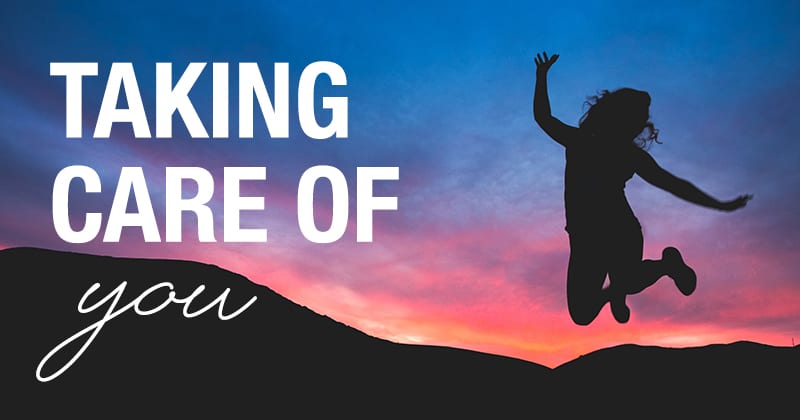Taking Care of YOU
 Having cancer in the midst of a global pandemic is scary. But we’re here to offer you and your family hope.
Having cancer in the midst of a global pandemic is scary. But we’re here to offer you and your family hope.
Seth Errion, a Masters Level Counseling Intern, is currently providing support to patients at Illinois CancerCare and has some tips to keep in mind.
Seth reminds us that although there’s still sometimes a stigma surrounding mental health, it’s important to remember that it IS a health issue and it deserves our attention. He shares his suggestions for taking care of your mental health during this difficult time.
What is the most common concern during a difficult time like social distancing?
Depression and anxiety are two of the most common issues among the general population. They can be more pronounced among cancer patients and their family caregivers, especially during a national emergency and a quarantine situation.
How can I help my loved one if they seem to be depressed?
Encourage them to talk about their feelings and listen without judgement. If they’re not ready to talk, just sit with them and let them know you’re happy to listen if or when they’re ready to talk.
Where can I turn for help?
At Illinois CancerCare, we have counselors on staff who are well-equipped to help cancer patients deal with the emotional challenges of a cancer diagnosis, treatment and recovery. With the concern about the spread of the COVID-19 virus, there may be times that a face-to-face appointment isn’t the best option and we may opt for phone calls or video chats. As the world continues to change, we will adapt to deliver the safest care possible.
Are there other resources that provide additional support?
Even if you normally see a therapist, you may not be able to see them in person at this time due to stay-at-home guidelines. We suggest that you contact your therapist’s office to see if they’re offering phone or video appointments. If they aren’t, ask them for referrals to remote services. Although human contact is often the preferred way to stay in touch, here are a few other ways to remain connected:
- CaringBridge® – Launched more than two decades ago with the vision of a world where no one goes through a health journey alone, CaringBridge has served as a touch-point with more than 2.4 billion cumulative site visits. You or a loved one can create a free private website that can be shared with friends and family to keep people updated on your diagnosis and treatment. Their goal is to mobilize the power of community for help, hope and healing.
- LivingWith® – Created by Pfizer Oncology, this free mobile app was designed to help you manage life with cancer. This comprehensive tool includes tips for healthy living, organizational resources for appointments and tasks, and an option to create a private circle of support. The LivingWith: Cancer app is available in your app store.
 I’ve heard that journaling can be helpful. Can you explain how?
I’ve heard that journaling can be helpful. Can you explain how?
Journaling is simply the process of jotting down your feelings each day without judging yourself. Incorporating daily journaling can be an important part of your “new normal” routine, giving you another consistent opportunity to take control of your day. With the current pandemic, your journal could even become an interesting look back at this unique time in history.
How can I deal with my anxiety, especially during this extra stressful time?
One of the things that contributes to increased anxiety is the feeling that you don’t have control over a situation – and today’s pandemic environment is the epitome of that feeling.
One of the most important things you can do is to create a routine and stick to it. Not only does this provide a sense of control over your life, but it also supports better health with consistent eating, exercise, socializing (remotely) and sleep patterns. An example of a daily socializing activity is to call a friend or family member every day at a certain time – it could be the same person each day or you could reach out to a wider range of people.
My anxiety isn’t manageable and I’m not able to see a therapist right now. What can I do?
If you don’t have a therapist, you can contact us or a therapist you’ve seen in the past to request a referral to remote or online services. In addition, meditation provides positive physical and emotional benefits, making it a good activity for all of us. Grounding techniques are good tools for managing your anxiety, including during a panic attack. Here are some specific examples:
- Stop, Breathe & Think® – This free mobile app, that also includes a paid premium version, provides a good way to check in with how you’re feeling and will recommend short activities based on your current emotions.
- 5, 4, 3, 2, 1 – As with other grounding techniques, this one is designed to help you focus on the present instead of the anxiety that’s swirling around inside your mind. The process involves identifying five things you can see, four things you can feel, three things you can hear, two things you can smell and one thing you can taste. This focus on your senses can help distract you from your concerns.
- Deep Breathing Exercises – When experiencing anxiety, breaths become shallow and more restricted instead of filling the lungs with full, complete breaths. There are many different ways to improve your breathing and slow down your racing heart.
I’m having a hard time seeing past the current situation.
Whether you’re discouraged about your cancer recovery or worried about the battle against the coronavirus, there are many bright moments happening all around us. Sometimes we have to intentionally take the time to look beyond the bad news and focused on those moments of sunshine.
Whether it’s a news report about a 7-year-old boy collecting masks for healthcare providers or a story about a teacher who has sent 100 letters to her students, there’s a lot of good news out there! Take some time every day to look for those bright spots – and do something special for someone else if you can.
Above all, please know that everyone at Illinois CancerCare is here for you and your family.
We encourage you to reach out to us or to your loved ones when you’re feeling down or stressed out. You can even call Seth at (309) 323-0028 or e-mail KBienemann@illinoiscancercare.com. We’ll all get through this together!



